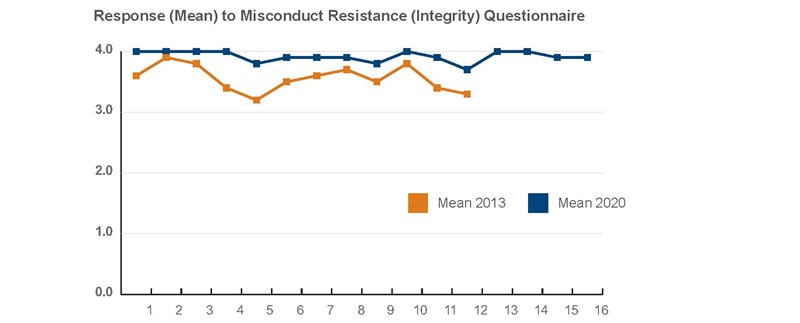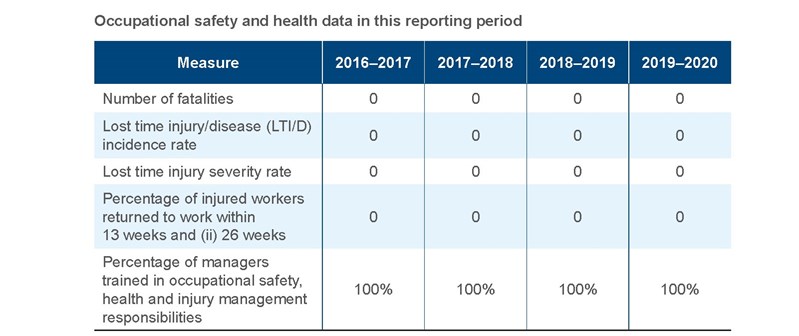Disclosures and legal compliance
Good governance
Integrity Strategy for WA Public Authorities 2020–2023
To meet the Public Sector Commission’s requirement to implement the Integrity Strategy for WA Public Authorities 2020–2023, Corporate Executive and managers reflected on the office’s policies, procedures and processes. The status of the Commissioner’s approach to integrity was assessed using the Integrity Snapshot Tool provided by the Public Sector Commission. The Commissioner’s response was added to the Corporate Governance Framework as a means of supporting the staff’s commitment to improving integrity.
An integrity survey to measure the Commissioner’s modelling and embodying of a culture of integrity was given to all staff to complete in 2020. The first 12 questions were the same as the previous 2013 survey, with four more added from the 2019 Public Sector Commission’s Integrity framework, enabling the Commissioner to compare the results. The results showed that the Commissioner’s staff responses to their perceptions on misconduct resistance improved across all questions.

Internal Audit Committee
The Commissioner has revised the format of his Internal Audit Committee as another means of responding to the Public Sector Commission’s key actions for improving areas to promote integrity and help prevent misconduct and corruption. The Treasurer’s Instruction 1201 has determined that government agencies should have an independent chair for their Internal Audit Committee as an element of their system and control requirements for public authorities. The Chair of the Commissioner’s Internal Audit Committee is Jeremy Hubble, General Manager Corporate Services, Lotterywest. The Commissioner acknowledges Lotterywest for agreeing to release Mr Hubble to act in this role. An Internal Audit Charter and a Strategic Internal Audit Plan 2019–20 to 2022–23 have been developed by the Committee.
Internal audit
Under the WA Government Common Use Agreement, the Commissioner engaged William Buck to provide internal audit services on procurement and payments and leave entitlements.
No risks requiring urgent management attention were noted in respect of current procedures and compliance with the current government reporting requirement.
Risk management
The management of risk and associated risk mitigation strategies continued to be a focus in 2019−20. A formal review of any identified corporate risks (e.g. human resources, integrity and conduct, ICT governance including cyber security) is incorporated into the monthly Corporate Executive meeting agenda and in all templates for project management. The Corporate Risk Register is reviewed by Corporate Executive as a standing item on the agenda each quarter.
Financial management
A monthly financial management report is provided for endorsement at all Corporate Executive meetings. The Financial Management Manual is constantly reviewed and updated by the Commissioner’s Chief Finance Officer to ensure currency with legislative and policy changes.
Policies and procedures
The Commissioner’s policies and procedures are reviewed, updated regularly and new policies added to the Corporate Governance Framework once endorsed by Corporate Executive. The Commissioner’s Business Continuity Plan was extensively revised in March 2020 to incorporate a section on prevention, preparedness, response and recovery for a pandemic.
Ministerial directives
Except under Section 26 of the Commissioner for Children and Young People Act 2006, the Commissioner is not subject to direction by a Minister or any other person in the performance of his functions.
There were no directions under Section 26 of the Act in 2019−20.
Other financial disclosures
Board and Committee Remuneration
The Commissioner does not have any State Boards or Committees as defined in the Premier’s Circular 2010/02 – State Government Boards and Committees.
Employment and Industrial Relations
At 30 June 2020, the Commissioner for Children and Young People employed 15.4 full-time employees (FTE), which is a small increase in staff from the previous year and includes a school-based trainee working one day a week. The Commissioner has one staff member on placement from another agency.
In December 2019, the average tenure for the Commissioner’s staff was 6.9 years, compared to 9.1 years for the WA public sector entities. Staff working at the Commissioner’s office for less than five years was 62.5 per cent, compared to 45.5 per cent WA public sector wide.
Females comprised 82.4 per cent of the Commissioner’s workforce compared to 72.7 per cent within the Western Australian public sector entities.
The Commissioner’s office does not have any employees working in regional areas.
Staff development
Staff training and development continues to be a high priority for the Commissioner. All staff participate in Performance Appraisal and Development sessions with their line manager at the beginning of the year. The Performance Appraisal and Development sessions provide a framework for planning, developing, reviewing and appraising the work of individual staff members with reference to the Commissioner’s strategic directions and annual business/operational plan. The public sector’s Capability Frameworks, Capability profile: levels 1–6 and the Leadership Capability profiles (level 7 to class 4) are also used as part of the appraisal process.
Monies spent for professional development for the Commissioner’s staff was approximately $11,000 for the 2019–20 financial year, this represents an average amount of approximately $700 per staff member.
All staff attended a Youth Disability Advocacy Network workshop, an Ethics and Accountability workshop and a session on ‘Dealing with difficult customers’ as professional development.
Worker’s compensation
There were no worker’s compensation claims in 2019–20, and no work-related injuries. The Commissioner’s office complies with the Workers Compensation and Injury Management Act 1981 and Public Sector Commissioner’s Circular 2012/05 and would ensure that, should there be any work-related injuries, they would be managed and reported in accordance with these requirements.
The Hazard Identification Checklist and quarterly inspections have continued during 2019–20 with the latest inspection being held in April 2020. The results of these inspections are tabled at Corporate Executive meetings, and any findings or issues addressed immediately.
Governance disclosures
The Commissioner has no governance disclosures to make.
Contracts with Senior Officers
At the date of reporting, no senior officers, or firms of which senior officers are members, or entities in which senior officers have substantial interests, had any interests in existing or proposed contracts with the Commissioner for Children and Young People other than normal contracts of employment of service.
Other legal requirements
Advertising
Section 175ZE of the Electoral Act 1907 requires public agencies to report details of expenditure to organisations providing services in relation to advertising, market research, polling, direct mail and media advertising. The agency has not incurred expenditure of this nature.
Disability access and inclusion plan
The Commissioner’s Disability Access and Inclusion Plan 2020 was revised this year.
The Disability Access and Inclusion Plan is available to all staff. It forms part of the Commissioner’s standard induction information and is available in the records management system of the office and on the website.
Compliance with Public Sector Standards and ethical codes
The Commissioner has a strong commitment to promoting integrity in official conduct and is committed to achieving high standards of monitoring and ensuring compliance with the Public Sector Standards, the Western Australian Public Sector Code of Ethics and the office’s Code of Conduct. The Corporate Executive, which includes the Commissioner, leads and promotes these standards within the office.
The office has policies, procedures and processes that support the application of:
- the WA Public Sector Code of Ethics
- the WA Public Sector Standards in Human Resources Management
- the Commissioner’s Code of Conduct and Management of Conflict of Interest Policy
- a family-friendly workplace.
During 2019–20 the Commissioner held regular staff meetings where any matters relevant to Public Sector Standards could be raised and discussed.
Compliance with Public Sector Standards
The Commissioner has established procedures to ensure compliance with s31(1) of the Public Sector Management Act 1994.
No Breach of Standard Claims were lodged in the current reporting period.
Compliance with the Western Australia Public Sector Code of Ethics
There has been no evidence of non-compliance with the Public Sector Code of Ethics.
Compliance with the Commissioner for Children and Young People Code of Conduct
There has been no evidence of non-compliance with the Commissioner’s Code of Conduct. There were no public interest disclosures about the activities of the Commissioner’s office.
Recordkeeping Plan
The Recordkeeping Plan for the Commissioner was approved by the State Records Commission in August 2019. Recordkeeping forms part of the induction process for new staff members and staff are regularly updated and reminded about their recordkeeping responsibilities by email.
Government policy requirements
Substantive equality
The Commissioner is not required to implement the Government’s Policy Framework for Substantive Equity but supports the intent and substance of the Policy Framework for Substantive Equality.
Reconciliation Action Plan
All work undertaken by the Commissioner is underpinned by the legislative requirement to have special regard for Aboriginal and Torres Strait Islander children and young people, which ensures that the principles identified within the Reconciliation Action Plan (RAP) are integrated into all office procedures and practices. These include:
- A review and evaluation of the implementation of the RAP July 2018–July 2020, resulting in an updated RAP for July 2020–July 2022
- Acknowledgement of traditional ownership in all speeches by the Commissioner in 2019–20
- Production of a video featuring WA Aboriginal children and young people speaking about the importance of Country and culture, which is played at all events hosted by the Commissioner and in all of the Commissioner’s presentations
- In planning regional visits, the Commissioner respects cultural authority and requests permission from Elders to visit communities and engage with their young people
- All submissions to the Corporate Executive are reviewed to consider and identify any implications for Aboriginal and Torres Strait Islander children and young people
- Any consultations conducted by or on behalf of the Commissioner for Children and Young People must include young Aboriginal people or their representatives where appropriate
- Participation of all staff in Aboriginal cultural workshops determined by mapping staff understanding against an Aboriginal Cultural Standards Framework
- Display of art by young Aboriginal people in the Commissioner’s office.
Occupational safety, health and injury management
Active and continuous improvement in safety management practices at the Commissioner’s office demonstrates the Commissioner and staff’s dedication to this aspect of office life. This has been particularly important during the COVID-19 pandemic when some staff worked off-site.
Occupational safety and health is a standing item on the monthly Corporate Executive meeting agenda and on the monthly staff meeting agenda. This enables any staff to raise a concern if required. The Commissioner has a dedicated occupational safety and health staff representative who conducts Workplace Safety Hazard Inspections every three months that are then tabled at Corporate Executive meetings for notation.
All workstations have been provided with a sit-stand desk attachment.
There have been no critical incidents to report for the 2019–20 year.

National Principles for Child Safe Organisations and Child Friendly Complaints Mechanisms
In February 2019, the Council of Australian Governments, including the Premier of WA, endorsed the National Principles for Child Safe Organisations for adoption and application throughout all relevant sectors and organisations in child-related work.
The Commissioner comprehensively reviewed and evaluated the child safe strategies across his office and in the team's work with children and young people in 2016. Actions were identified to strengthen processes and practices, and these were undertaken and noted as complete by the Corporate Executive. In 2019–20, the Commissioner reviewed the child safe practices again as part of the continuous improvement processes and included feedback from children and young people, parents and stakeholders involved with the team.
The Commissioner has comprehensive child safe strategies in place, including a structured approach to risk management to clearly identify, analyse, evaluate and implement mechanisms to eliminate or mitigate identified risks to the safety and wellbeing of the children and young people in all work, consultations, advisory committees and in the community.
National Principle Six details the implementation of child friendly complaints process. The Commissioner has readily accessible mechanisms for children and young people and their families/advocates to provide feedback and to make complaints that meet the expectations of this principle.
In 2019–20, feedback from children and young people was proactively sought in every consultation activity. No complaints were made by children and young people or adults about the Commissioners projects, activities or office.



